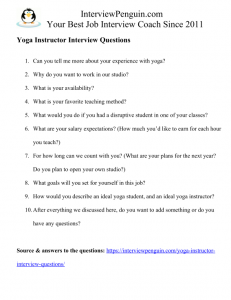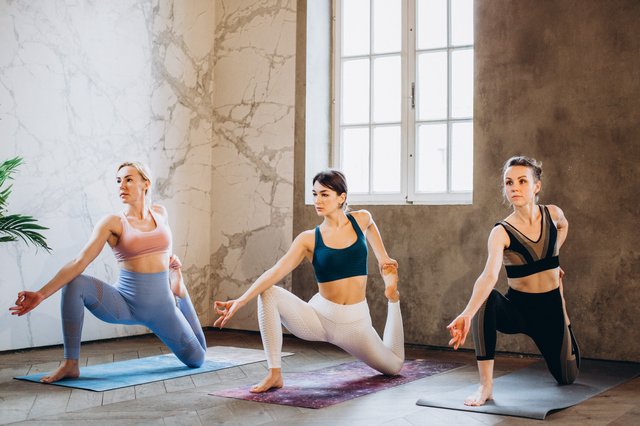Yoga has become almost a mainstream thing in the Western world. We sit too much and move too little, and try to compensate for it, seeking a better balance, for both body and mind. Yoga is a perfect exercise to achieve that feat. And even if we do not succeed, at least we do something fancy we can talk about with friends… Increased demand for yoga classes results in an increased demand for yoga instructors. Can you become the next one?
As you can likely imagine, your experience is the most important thing in this interview. It will be hard to succeed unless you’ve been practicing for years, and attended at least a couple of seminars/retreats organized by big names in the yoga world.
But experience alone does not guarantee you will land a job. You have to demonstrate right attitude to working with beginners, your teaching skills, and of course also agree about the schedule and salary you will get for your work. Let’s have a look at 10 questions you may face while interviewing in any good yoga studio.
Table of Contents
Can you tell me more about your experience with yoga?
They are looking for an in-detail answer. When you started, what was the original impulse, what you were seeking. Tell them the names of your teachers, all types of yoga you practiced, and for how long, names of any seminars/retreats you completed.
It is also important to talk with enthusiasm (you can talk calmly and with enthusiasm at the same time), so they get an impression that you enjoy practicing yoga, that it is almost a lifestyle for you. You can also stress that though you’ve been in a field for long enough (definitely long enough to teach), you still try to improve on your skills, and do not feel like you’ve reached your limits yet.
Why do you want to work in our studio?
Try to praise their place for something. In an ideal case you should say that you like their philosophy, pricing, the approach instructors have to the students, the way they run their place, the vibe, anything. You can say that you read the reviews online and also talked to some of the students, while doing your research.
You can also say that the types of yoga they teach their students match well with your experiences, and that you’d like to stay in the same field.
If you are applying for your very first yoga instructor job, you can say that you know that their place gives a chance to people who are just starting out their yoga teaching career, and that was the major factor in your decision. In any case, they should get an impression that they are your first choice, and for a good reason.
What is your availability?
Four out of five yoga teachers do this part time. More likely than not you have another job, or perhaps run your own private yoga lessons, and are simply looking for an additional source of income.
Nothing wrong with this attitude, they expect it anyway. But you should show some flexibility, and it is pivotal to be able to work in the afternoons/evenings, at least on some days in a week.
Try to prepare a clear schedule for each day of the week, explaining why you cannot work on this or that day (because you are going to school, lead your own private lesson, work at Starbucks at that time, whatever). It’s fine when you give your school or regular job a priority, but this yoga instructor job should come right after them on your list.
Before interviewing for the job, have a peak on the calendar on their website (or on Facebook). It should help you to understand when they do their classes, and hopefully you can find some empty spaces in your schedule to accommodate them.
What is your favorite teaching method?
I suggest you to refer to individual approach, and to actively helping the students with their postures, balance, and other things. Ensure them that you do not plan to sit on your mat and quietly laugh when you see how badly someone does this or that asana…
On the contrary, you will walk around the classroom (gym), talking to the students, pointing out mistakes and helping them to correct them. That’s the attitude most yoga studios seek in their new instructors, because they know that such attitude will translate into good online reviews and good reviews translate into new clientele, and eventually into better profits.
What would you do if you had a disruptive student in one of your classes?
People typically pay for their yoga classes, so it’s not common to deal with disruptive students. Unless they are bored in the lessons, or unsatisfied with the instructor. You can start your answer by saying that it is unlikely to happen, since you try to have a good dynamics in your classes and keep the students engaged.
If it happened however, you would not let them destroy the morale in the entire yoga class, or disturb the rest of the students. Say that you’d call them out of the room and in a calm voice ask what’s wrong. At the end of the day they are a paying client, and you want to understand why they are disruptive, and what you can do about it as an instructor.
Following your talk you’d try to remedy the situation. And if that did not work (for whatever reason), and the student kept disturbing the rest of the class, you’d tell them not to come the next time–unless they changed their behavior, of course.
5 other questions you may face in your yoga teacher interview
- What are your salary expectations? (How much you’d like to earn for each hour you teach?)
- For how long can we count with you? (What are your plans for the next year? Do you plan to open your own studio?)
- What goals will you set for yourself in this job?
- How would you describe an ideal yoga student, and an ideal yoga instructor?
- After everything we discussed here, do you want to add something or do you have any questions?
* You can download the list of all questions in a one page long PDF, and practice your interview answers anytime later, even when offline:

Conclusion, next steps
Interview for a job of a yoga instructor belongs to easier interviews. The demand for yoga classes is growing, and so is the demand for teachers, and many studios are understaffed.
As long as you do not remain silent when they ask you their questions, show the right attitude to teaching and demonstrate your experience, and do not have unrealistic expectations when it come to your salary, they will give you a chance to prove your yoga teaching skills. I hope you will manage it and wish you good luck!
Matthew
May also interest you:
- Swim Instructor interview questions.
- PE Teacher interview questions.
- Dance instructor interview questions.

